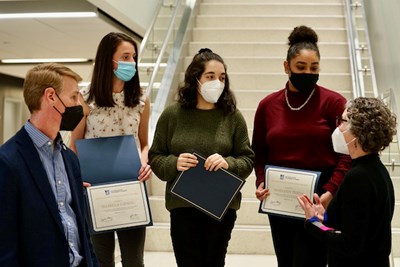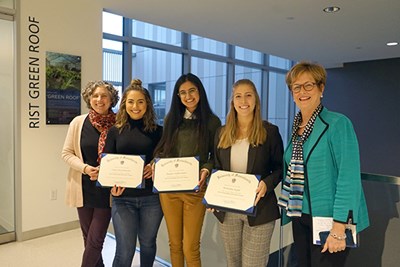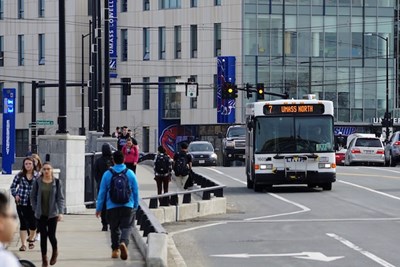Projects Look to Reduce Carbon Emissions
 Image by Brooke Coupal
Image by Brooke Coupal
04/11/2023
By Brooke Coupal
A group of students discovered that cutting greenhouse gas emissions could be as simple as getting a ride to UMass Lowell from a friend.
With this in mind, environmental science seniors Kyle Luchford, Daniel LeCain and Davis Trang developed a carpooling initiative, which won first place at the fourth annual Rist Institute for Sustainability & Energy Climate Mitigation Challenge.
Open to students of all majors, the challenge prompts teams to come up with innovative ways to reduce emissions by 10,000 pounds of carbon dioxide (CO2) in 10 weeks, either at the university or in the surrounding community.
“We tried to think of something that was the least amount of effort for the most amount of impact, and carpooling seemed like the easiest way to get people to save on emissions,” says Luchford, who presented his team’s winning project at a recent award ceremony in Alumni Hall.
The team proposed decreasing the number of vehicles that travel to and from campus each week by creating incentives for more commuters to carpool. The three suggested the creation of a centralized UML app that would serve as a hub for students to join programs. The app would promote the existing on-campus carpool program to commuters, which offers cheaper parking permits and preferred spaces in parking lots.
“UMass Lowell has a lot of resources that are quite useful for commuters that a lot of students don’t know about,” says Luchford, a Groton, Massachusetts, native who developed the project last semester in the Climate Change: Science, Communication, Solutions course taught by Environmental, Earth and Atmospheric Sciences Prof. Juliette Rooney-Varga.
The team also recommended implementing a reward system in which students would amass points through shared rides with other passengers. Students could then use the points at the end of each semester to collect prizes, such as UMass Lowell merchandise.
“Adding these incentives and highlighting the existing ones will really make carpooling a no-brainer,” says Luchford, who estimates that the carpooling initiative could reduce CO2 emissions by more than 300,000 pounds in 10 weeks.
 Image by Brooke Coupal
Image by Brooke Coupal
To help move the team’s proposal toward implementation, Rist Institute Executive Director Ruairi O’Mahony is connecting the students with the university’s Transportation and Parking Committee, which is already working to raise awareness about commuter programs through a subcommittee led by the Student Government Association.
“Our ability to funnel these projects into the innovation ecosystem that exists at UMass Lowell is really what it’s all about,” O’Mahony says. “These new perspectives energize our work.”
While presenting the awards, Provost Joseph Hartman reiterated that the student projects give university executives a new outlook on how to make the campus more sustainable.
“This is why we love working with our students,” he said. “There’s a lot of good information there that we will take back and think about further.”
Second place went to students Shumoya Morris-Duffus, Grace Ruchala and Danielle Proux for their proposal of making one class day each month virtual.
“By taking a day where students and professors stay home and do not commute to campus, it would result in a drastic drop in CO2, which is emitted through commuting vehicles,” says Proux, an environmental science senior from Boxborough, Massachusetts.
Students Daniel De Binder, Andrew Egan and Joanita Kagere came in third place with their idea of implementing an intercampus route containing more walkways and bike lanes that are separated from automobile traffic.
“That’s going to make it really attractive for people to bike, scooter and walk on campus,” says Egan, a biological sciences senior from Groton, Massachusetts. His team predicts that only 6% of commuters living within three miles of campus would have to switch to walking or biking to cut 10,000 pounds of CO2 in 10 weeks.
 Image by Brooke Coupal
Image by Brooke Coupal
“Not only do these students learn about solutions, but they design them and advocate for implementing them,” says Rooney-Varga, the director of the Climate Change Initiative and co-director of the Rist Institute. “Students build skills and knowledge needed to make a difference in the real world, and the UML community benefits directly when those student ideas become part of our sustainability efforts.”



